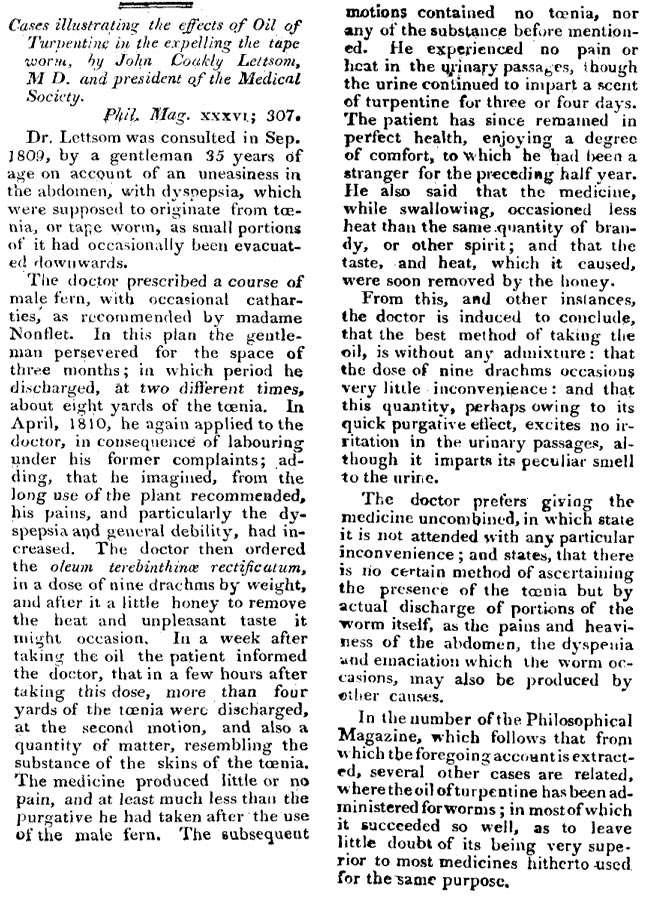
back to Healing with Turpentine
A more readable transcription is below the image

|
Cases Illustrating the Effects of Oil of Turpentine in the Expelling the Tapeworm by Lettsom, John Coakly Publication date 1811-01-31 Publisher The Belfast Monthly Magazine
Cases illustrating the effects of Oil of Turpentine in the expelling the tape worm, by John Coakly Lettsom, M. D. and president of the Medical Society. Phil. Mag. xxxvi; 307 Dr. Lettsom was consulted in Sep. 1809, by a gentleman 35 years of age on account of an uneasiness in the abdomen, with dyspepsia, which were supposed to originate from toenia, or tape worm, as small portions of it had occasionally been evacuated downwards. The doctor prescribed a course of male fern, with occasional catharties, as recommended by madame Nonflet. In this plan the gentleman persevered for the space of three months; in which period he discharged, at two different times, about eight yards of the toenia. In April, 1810, he again applied to the doctor, in consequence of labouring under his former complaints; adding, that he imagined, from the long use of the plant recommended, his pains, and particularly the dyspepsia and general debility, had increased. The doctor then ordered the oleum terebinthinae rectificatum, in a dose of nine drachms by weight, and after it a little honey to remove the heat and unpleasant taste it might occasion. In a week after taking the oil the patient informed the doctor, that in a few hours after taking this dose, more than four yards of the toenia were discharged, at the second motion, and also a quantity of matter, resembling the substance of the skins of the toenia. The medicine produced little or no pain, and at least much less than the purgative he had taken after the use of the male fern. The subsequent motions contained no toenia, nor any of the substance before mentioned. He experienced no pain or heat in the urinary passages, though the urine continued to impart a scent of turpentine for three or four days. The patient has since remained in perfect health, enjoying a degree of comfort, to which he had been a stranger for the preceding half year. He also said that the medicine, while swallowing, occasioned less heat than the same quantity of brandy, or other spirit; and that the taste, and heat, which it caused, were soon removed by the honey. From this, and other instances, the doctor is induced to conclude, that the best method of taking the oil, is without any admixture: that the dose of nine drachms occasions very little inconvenience: and that this quantity, perhaps owing to its quick purgative effect, excites no irritation in the urinary passages, although it imparts its peculiar smell to the urine. The doctor prefers giving the medicine uncombined, in which state it is not attended with any particular inconvenience; and states, that there is no certain method of ascertaining the presence of the toenia but by actual discharge of portions of the worm itself, as the pains and heaviness of the abdomen, the dyspenia and emaciation which the worm occasions, may also be produced by other causes. In the number of the Philosophical Magazine, which follows that from which the foregoing account is extracted, several other cases are related, where the oil of turpentine has been administered for worms; in most of which it succeeded so well, as to leave little doubt of its being very superior to most medicines hitherto used for the same purpose.
|
|
The British Weights and Measures Act of 1878: The British drachm was 1⁄8 of an apothecaries' ounce of 480 grains, thus equal to 60 grains. I grain is about 65 milligrams. 9 drachms is 540 grains, is 35,100 milligrams, is 35 grams. |